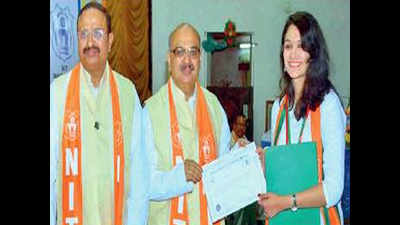- News
- City News
- Hyderabad News
- 1,528 students get degrees at NIT Warangal convocation
Trending
This story is from August 18, 2019
1,528 students get degrees at NIT Warangal convocation
A record 1,528 candidates received their degrees during the National Institute of Technology (NIT), Warangal’s 17th convocation held at the campus on Saturday. Among the graduating candidates, 76 got their PhD degrees; 555 M-Tech and other post-graduate degrees and 897 were awarded B-Tech degrees.

Y Sahiti (extreme right) receives the institute gold medal from chief guest Nitin Tripathi. NIT, Warangal director N V Rama Rao is also seen
WARANGAL: A record 1,528 candidates received their degrees during the National Institute of Technology (NIT), Warangal’s 17th convocation held at the campus on Saturday. Among the graduating candidates, 76 got their PhD degrees; 555 M-Tech and other post-graduate degrees and 897 were awarded B-Tech degrees.
The institute gold medal was handed to Y Sahiti of the computer science and engineering department for having the highest CGPA among all branches of engineering.Gold medals were also handed to each of the toppers in the B-Tech course from the eight departments.
Addressing the students NIT, Warangal director N V Rama Rao said that 35 research projects worth Rs 20.87 crore had been sanctioned by the Science & Engineering Board to various departments in the past year. Rao said that the institute had conducted 51 Global Initiative of Academic Networks (GIAN) courses, the highest among all NITs in the country. The institute, he mentioned, had also secured 10 research projects worth Rs 5.5 crore with international collaboration under the Scheme for Promotion of Academic and Research Collaboration (SPARC).
Chief guest Nitin Kumar Tripathi, director of special degree programmes and professor of geo-informatics at Asian Institute of Technology Pathumthani, Thailand, delivered the convocation address. Tripathi advised graduates to become experts in their domains so as to meet challenges the industry throws up. He also asked them to serve people without any prejudice of religion or cultural bias and added that adapting to new technologies was the need of the hour.
The institute gold medal was handed to Y Sahiti of the computer science and engineering department for having the highest CGPA among all branches of engineering.Gold medals were also handed to each of the toppers in the B-Tech course from the eight departments.
Addressing the students NIT, Warangal director N V Rama Rao said that 35 research projects worth Rs 20.87 crore had been sanctioned by the Science & Engineering Board to various departments in the past year. Rao said that the institute had conducted 51 Global Initiative of Academic Networks (GIAN) courses, the highest among all NITs in the country. The institute, he mentioned, had also secured 10 research projects worth Rs 5.5 crore with international collaboration under the Scheme for Promotion of Academic and Research Collaboration (SPARC).
Chief guest Nitin Kumar Tripathi, director of special degree programmes and professor of geo-informatics at Asian Institute of Technology Pathumthani, Thailand, delivered the convocation address. Tripathi advised graduates to become experts in their domains so as to meet challenges the industry throws up. He also asked them to serve people without any prejudice of religion or cultural bias and added that adapting to new technologies was the need of the hour.
End of Article
FOLLOW US ON SOCIAL MEDIA










